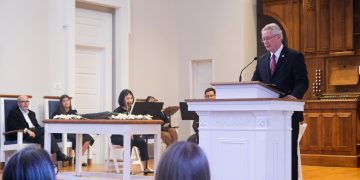When thinking about what I would write for my farewell address, I thought about a traditional farewell telling you all how much I’ve enjoyed this experience and how much I’ll miss serving in this position. I also thought about the journalistic farewell in which I would tell you how much I love storytelling and explain to you how a newspaper works. But I think you all know all of those things, so I’ve decided to go a different route.
My experience at this university and as editor-in-chief of The Daily Mississippian has largely been shaped by my identity as a Black woman — partly because Ole Miss is defined by its racial history and partly because the university celebrated the 60th anniversary of integration during the 2022-23 school term (October 2022). In this farewell address, I’ll instead talk about my hopes and fears for the University of Mississippi.
In a 1998 article for The Daily Mississippian, James Meredith, the university’s first Black student, mentioned that the last hurdle to overcome in regards to integration is making the Black student another regular student and committing to a one school, one student category by 2003. I would say this goal has been achieved. But one of the things I hope we can eventually acknowledge is that allowing Black students to enroll at the university doesn’t equate to accepting Black students as individuals who have earned the right to be here.
Choosing this university is definitely one of the best decisions I ever made because as a student here, I’ve been fortunate in a lot of ways. I’ve been able to be a part of many student organizations on campus and meet some of the most wonderful people. I’ve been able to travel to many different places because of this university. But to say my experience is representative of the Black student experience is far from the truth, which calls into question whether this university is truly capable of creating spaces for minority students.
You can walk this campus for 20 minutes and never encounter another student of color. I can physically count the amount of Black students I’ve had classes with. The same issue is present when it comes to Black faculty on campus. It’s those things that many people think are small that worry me about this campus.
Wonder what I mean by those “small things?”
“You’re well-spoken.” Yes, I am well-spoken, thank you for the compliment? But what convinced you I wouldn’t be?
“We’re not using (insert any racist symbol) in a racist way.” I understand, but does that erase the fact that that is, in fact, a racist symbol?
“Can I touch your hair?” No. Would I ask to touch your hair?
A lack of representation combined with those “small things” that happen too many times in a day deter Black students on this campus. What you consider small — the way I talk, those racist symbols (used for other purposes), my hair — is something big for me, and I hope that one day that will be acknowledged on this campus.
In a place where you hardly ever see yourself represented, will it ever be possible to feel as if you belong? My fear is that we’ll never reach that place where Black students truly feel comfortable on this campus — a place where we don’t have to change the way we talk, the conversations we have, the foods we eat or how we wear our hair. I fear that the misunderstanding of Black life and Black culture will always be a problem. I fear that, despite our best efforts, the university’s racist history will linger in the shadows forever.
But my hope — and I have more hope than anything — is that we will continue to recruit Black students, and in a few years when a Black student chooses this university, they won’t enter a classroom and be the only Black student. Representation is vital, and without it, convincing other Black students that this is a place where they can get a quality education and feel they are welcome will be quite difficult. My biggest hope is that more Black students will choose to call this university home, and this university will choose to make Black students feel at home.
In his article, Meredith predicted that Ole Miss would be the Harvard of America, and Mississippi would be the picture of the “Good Life.” For Ole Miss to be the “Harvard of America,” in a state that is the picture of the “Good Life” and the “model of equality, freedom and Free Enterprise,” the university needs to ensure that this is a place where minority students feel welcomed for who they are and all the differences they possess.


























